You are here
Tensions rise ahead of budget bill debate
By Omar Obeidat , Khetam Malkawi - Jan 27,2015 - Last updated at Jan 27,2015
AMMAN – A dispute between the government and MPs is likely to deepen in the coming days as differences over electricity tariffs are set to add to the customary tension over the budget as the House soon starts marathon deliberations on the draft law, lawmakers and analysts said Tuesday.
In separate interviews with The Jordan Times over the phone, MPs said they would use the draft 2015 state budget law, presented to the Lower House nearly two months ago, as “tool of pressure” to press the government to freeze the hikes in power tariffs or otherwise face a vote of no confidence.
Analysts said both the government and the House have reached the point of no return over electricity prices, as debating the budget bill would be dominated by a political agenda rather than financial concerns.
Economist Zayyan Zawaneh said “intransigence” is the right word to describe the current scene as the House is trying to gain more popularity rather than solve the issue, while the government is trying to prove to international organisations, particularly the International Monetary Fund (IMF) and donor countries, that it will honour its obligations to solve the losses of the state-owned National Electric Power Company (NEPCO) by gradually lifting the power subsidy.
“This behaviour does not serve the country,” Zawaneh warned, saying that politics is harming the already weak fiscal situation.
The government is relying on offering statistics on the losses of NEPCO, while ignoring other issues such as waste in production, electricity theft, unpaid bills and the organisational structure of the company, he added, calling on authorities to come up with long-term strategies to solve the energy issue in the Kingdom, which he said is Jordan’s biggest challenge.
Both the government and the House have entered a bottleneck, the pundit said, adding that MPs will use budget assumptions related to building it on $100 per barrel of oil as their core argument to push the government to make concessions regarding power tariffs.
Issam Qadamani, an analyst and columnist at Al Rai daily, said the 15 per cent increase in electricity tariffs, which the government agreed to slash by half with a joint House panel last week, is meant to bring NEPCO to cost recovery and not to solve the debts of the company over the past years, estimated at JD4 billion.
Tensions over the power file will mount, Qadamani said, and the budget debate will be the next battle.
“The possibility of rejecting the budget with the assumptions planned by the government is very likely now,” the columnist said, adding that the government would not accept freezing the decision to increase electricity prices.
Qadamani accused MPs of seeking to gain popularity without offering any alternative solutions to the energy dilemma in Jordan, adding that he expected the government to go on with hiking power tariffs but by 7.5 per cent.
“The image of the House is the focus of MPs and they deal with the government as if it was the enemy,” he noted.
Deputies interviewed by The Jordan Times from the camp rejecting price rises said they will use all available constitutional means against the government, if the latter insist on going on with the raise, which went into effect January 1, as part of a programme of gradual hikes that started last year and will continue through 2017.
Rula Hroub from Al Nahdha Bloc said that one of the choices the bloc was considering is to vote down the state budget draft law, while the other is to suggest a motion of no confidence against Abdullah Ensour’s government.
“Once we are in agreement on the choice we want to take, we will lobby with other blocs,” Hroub told The Jordan Times over the phone.
Tareq Khouri, a deputy who also voted against the hike, said that regardless of the government’s decision, to cancel the price hikes or not, he is dissatisfied with the way the budget looks.
He insisted that the “poor” will be the most affected by the rising cost of power as they will reflect on prices of services and commodities.
Although none of the deputies opposing the hike presented an alternative to address NEPCO’s mounting losses, they threatened that if the hikes are not frozen, “the government will be in trouble”. Yousef Qorneh, head of the Lower House’s Financial Committee advised deputies not to make up their minds on the budget bill before they examine the recommendations the panel is preparing.
He believes that the proposed no-confidence motion will fail if it goes to vote.
Deputy Atef Qaawar said that the 7.5 per cent hike is the best solution and advised against rejecting the budget bill or pressing ahead with no-confidence vote to pressure the government into cancelling the electricity price hikes.
He explained that the government has no choice but to increase the electricity tariff as it has international obligations and commitments to the IMF to implement the economic correction programme.
Related Articles
The Lower House and the government are likely to remain at loggerheads over hiking electricity tariffs as a group of MPs is lobbying for a no-confidence vote.
The Lower House on Sunday rejected a recommendation by a joint parliamentary committee to raise electricity tariffs by 7.5 per cent instead of 15 per cent under a deal it recently reached with the government.
Disagreement over calculation of the exact debts of National Electric Power Company (NEPCO) dominated the joint Lower House panel's discussion with the government on Monday over the new electricity tariffs.


















